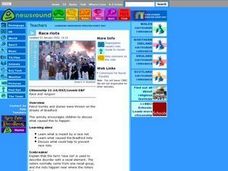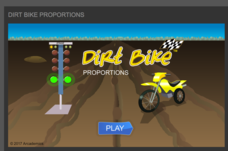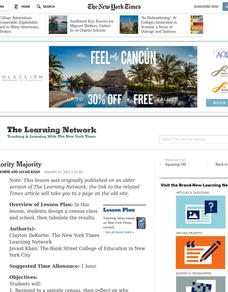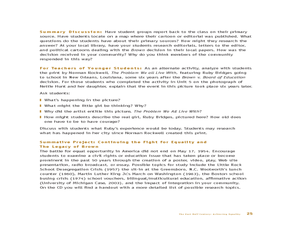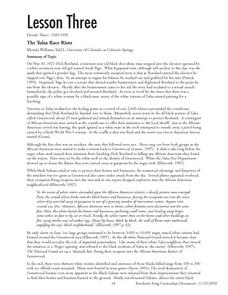CK-12 Foundation
Right Triangles, Bearings, and Other Applications: Sailing Race
Help your class get their bearings when it comes to right triangles. Pupils determine distances traveled or components given the bearing of a sailboat using an interactive. The scholars develop a sense of finding the bearings of a given...
Curated OER
Race riots
Young scholars encounter what is meant by a race riot. Students show what caused the Bradford riots. Young scholars discuss what could help to prevent race riots in the future. Students design a survey to see if there is any tension...
Curated OER
Early American Immigration and Race
Young scholars examine and define the different types of immigration. Using different documents, they identify types of migration. In groups, they compare and contrast the migration experiences of the Africans and the British. They...
Curated OER
Past Series: Reporting a Past Series of Events
In this past tense worksheet, students choose the correct verb in the past tense to complete the sentences. Students complete 19 sentences.
Curated OER
How Rosa Parks Sparked Change
Rosa Parks proves that one person, no matter their race, can make a difference.
Facing History and Ourselves
Preparing Students for Difficult Converstaitons
Many of the issues facing 21st Century learners are challenging and even discussing these issues can be a challenge. So how do teachers prepare learners for these difficult conversations? How do instructors create a safe classroom where...
News Literacy Project
News Goggles: Lionel Ramos, Oklahoma Watch
Given all the recent criticism of the news media and coverage, it's crucial that young people are given the tools they need to evaluate what they see, hear, and read about current events. A video interview from "News Goggles" introduces...
Centers for Disease Control and Prevention
Current Cigarette Smoking Among Adults Infographic
Adult cigarette smoking has decreased in recent years, but it is still the number one cause of preventable disease and death in America. An infographic breaks cigarette smoking down by education level, geographical region, gender, race,...
Arcademics
Penguin Jump
Don't jump to conclusions but to products instead. Pupils participate in an online race as penguins. Users choose the ice sheet with the correct product to the individual's multiplication prompt. The penguins jump from one product to...
Arcademics
Dirt Bike Proportions
Dirt Bike Proportions is a multi-player racing game that allows students from anywhere in the world to race one another while completing equivalent proportions!
Curated OER
The Minority Majority
Students design a census class and school, then tabulate the results. They respond to a sample census, then reflect on why questions of race and national origin are different.
Annenberg Foundation
Colonial Designs
The adventures of the New World came at a cost for Native Americans. Scholars investigate the economic side of settling the European colonies. Using video clips, statistical evidence, and primary sources, they create hypotheses and...
Curated OER
The Past Half Century: Achieving Equality
Students analyze reactions to the Brown vs. Education decision of 1954. In this segregation instructional activity, student look at the actions that were taken in the education world as a result of the Brown decision. They watch a CD,...
Curated OER
Nov. 2, 1976 | Carter Defeats Ford in Presidential Election
After reading about the presidential race in 1976, learners think critically about presidential legacy. They read all of the provided background information, related New York Times articles, and then respond to a writing prompt via blog...
Curated OER
Bias and Crime in Media
Critical thinking and social justice are central themes for this resource on bias and crime in media. The class views and discusses an incisive PSA that highlights assumptions based on race. Small groups read newspaper opinion pieces...
Curated OER
Erosion in Different Soils
Fourth graders observe and identify the effects of weathering and geological activities. They take part in an excellent hands-on group activity called "Erosion Race," in which each group tries to simulate erosion of soil in the quickest...
Advocates for Human Rights
The Rights of Immigrants in the United States
Based on their understanding of the Universal Declaration of Human Rights and the Rights of Migrants in the United States, groups adopt a human rights perspective and analyze media reports to evaluate how the US is addressing the rights...
Curated OER
Election Day
In this election day worksheet, students watch TV reports on election day and record the electoral votes at a given time. Students then predict who the winner will be.
Curated OER
Stirring the Melting Pot
Young scholars consider the interrelationships among race, ethnicity and culture. After reading the article, Young Japanese-Americans Honor Ethnic Roots, they examine ways in which they identify with and celebrate their own ethnicities.
Curated OER
The Tulas Race Riots
Students investigate the history of the race riots of Tulsa, Oklahoma. They describe personal experiences related to family and culture in order to make comparisons to the history that is researched. Then students report the findings to...
Curated OER
Literature Study Guide: To Kill a Mockingbird
Teaching tools designed to support student-centered literature study. Geared toward homeschoolers reading Harper Lee's book To Kill a Mockingbird, I would use these in my classroom. The materials are applicable to any text: graphic...
Digital Public Library of America
The Watsons Go To Birmingham—1963 by Christopher Paul Curtis
A primary source set of photographs, videos, newspaper articles, and FBI reports provides insight into race relations during the 1960s, the Sixteenth Street Baptist Church bombing, and the murder of Emmitt Till. Designed to be used to...
Curated OER
Slow and Steady Wins the Race
Students are introduced to the characteristics of fables. They read a fable by Aesop. In small groups, students identify fable characteristics present in Aesop's story and share their observations with the class.
Museum of Tolerance
Just What Kind of American Are You?
Your parents were both in different countries. You were born in the US. Documents and application forms ask you to identify your racial or ethnic classification. Which box do you check? Class members collect documents and application...



